2005-2007
1. I am a bastard-painter; born to an unmarried mother. I am a drag-painter; performing lurid roles, buggering dead heroes. I am a stranger-painter; not feeling at home, (without a shared language, common cause) I must behave like a thinker, turning to the essential categories of abstraction to protect myself from the blows of random chance, from contingency and from the unforeseen. Aristotle emphasized the contingent because no one deliberates on the necessary or impossible. The unavoidable and potentially unmanageable presence of multiple possibilities, or the complex nature of decisions creates and invites rhetoric. I am a rhetorical-painter; living and working in precarious times, navigating the permissive potentiality of pluralism, inhabiting a multiplicity of forms, facing the crisis and complexity of decisions at every turn.
In our period
they say there is free speech
they say there is no penalty for poets
there is no penalty, for writing poems
they say this
this is the penalty
Muriel Rukeyser In Our Time
2. I am a worker-painter. The worker today is flexible, cynical, chatty, and creative. I am seeking forms of resistance; being a bad worker, with a desultory, messy, slow and deeply private studio practice. I am seeking poetry. “And they fired me, only on account of the fact that I drag my feet, I move slowly, I look around even when it is not absolutely necessary. In our business, however, we need to lift our feet high off the ground, and bang them down again on the floor noisily, we need to move, hit the pavement, jump up, create dust, possibly a cloud of dust and then hide inside it.” Luciano Bianciardi from The Bitter Life
...and all day the black ants climb over them,
boring their deep and mysterious holes
into the curls,
craving the sweet sap,
taking it away
to their dark, underground cities--
and all day
under the shifty wind,
as in a dance to the great wedding,
the flowers bend their bright bodies,
and tip their fragrance to the air,
and rise,
their red stems holding
all that dampness and recklessness
gladly and lightly,
and there it is again--
beauty the brave, the exemplary,
blazing open.
Do you love this world?
-from Peonies by Mary Oliver
3. Under Capitalism, everything is new and nothing changes. Everyone is Other, difference abounds, yet there is no differentiation, no critique, no opposition. In these conditions of immanence, I am learning how to think, without an interlocutor, in the damp recesses of my own mind. "...there is the inner life of thought... there is also the thinking process by which we break into that inner life, and capture answers and evidence to support the the answers out of it. And that process of raid or persuasion or ambush or dogged hunting or surrender is the kind of thinking we have to learn, and if we don't somehow learn it, then our minds lie in us like fish in the pond of a man who can't fish." Ted Hughes, from On Thinking
4. I am a heretic-painter. Agonistically engaged with the dying dogma of Modernist painting, the heretic undergoes a process of determining how to live. Heresy is always the most fragile of positions, it requires to be both for and against. Heresiarchs always carry a tuning fork and a hammer.
5. I am a writer-painter in the time of Twitter, sound-bytes and idle talk. The writing of lines, one word at a time, disciplines my thought. Before the compass, people walked in long lines stretching toward the horizon. The last aligned their sight with the first, and shouted forward when the first would stray. Without this cooperation people walked in circles. Writing makes a line through time as well as space. The intergenerational contact produces forward motion. As a writer in dialogue with other writers I make progress, as a painter I digress. The tension between writer and painter is productive. “Only one who writes lines can think logically, calculate, criticize, pursue knowledge, philosophize... And the longer one writes lines, the more historically one can think and act. The gesture of writing produces historical consciousness... This feedback between those who write and historical consciousness lends that consciousness a rising tension that enables it to keep pushing forward. That is the dynamic of history...” Vilem Flusser from Does Writing Have a Future?
6. I make paintings to digest the technologies, tragedies and alienation of living now. They are filled with violence, mourning and doubt, but also joy. Their failure to provide answers exemplifies my own failure: I have only questions and the courage to live them. My courage is motivated by love; I love this world, and painting (hence other painters) taught me to love.
In our period
they say there is free speech
they say there is no penalty for poets
there is no penalty, for writing poems
they say this
this is the penalty
Muriel Rukeyser In Our Time
2. I am a worker-painter. The worker today is flexible, cynical, chatty, and creative. I am seeking forms of resistance; being a bad worker, with a desultory, messy, slow and deeply private studio practice. I am seeking poetry. “And they fired me, only on account of the fact that I drag my feet, I move slowly, I look around even when it is not absolutely necessary. In our business, however, we need to lift our feet high off the ground, and bang them down again on the floor noisily, we need to move, hit the pavement, jump up, create dust, possibly a cloud of dust and then hide inside it.” Luciano Bianciardi from The Bitter Life
...and all day the black ants climb over them,
boring their deep and mysterious holes
into the curls,
craving the sweet sap,
taking it away
to their dark, underground cities--
and all day
under the shifty wind,
as in a dance to the great wedding,
the flowers bend their bright bodies,
and tip their fragrance to the air,
and rise,
their red stems holding
all that dampness and recklessness
gladly and lightly,
and there it is again--
beauty the brave, the exemplary,
blazing open.
Do you love this world?
-from Peonies by Mary Oliver
3. Under Capitalism, everything is new and nothing changes. Everyone is Other, difference abounds, yet there is no differentiation, no critique, no opposition. In these conditions of immanence, I am learning how to think, without an interlocutor, in the damp recesses of my own mind. "...there is the inner life of thought... there is also the thinking process by which we break into that inner life, and capture answers and evidence to support the the answers out of it. And that process of raid or persuasion or ambush or dogged hunting or surrender is the kind of thinking we have to learn, and if we don't somehow learn it, then our minds lie in us like fish in the pond of a man who can't fish." Ted Hughes, from On Thinking
4. I am a heretic-painter. Agonistically engaged with the dying dogma of Modernist painting, the heretic undergoes a process of determining how to live. Heresy is always the most fragile of positions, it requires to be both for and against. Heresiarchs always carry a tuning fork and a hammer.
5. I am a writer-painter in the time of Twitter, sound-bytes and idle talk. The writing of lines, one word at a time, disciplines my thought. Before the compass, people walked in long lines stretching toward the horizon. The last aligned their sight with the first, and shouted forward when the first would stray. Without this cooperation people walked in circles. Writing makes a line through time as well as space. The intergenerational contact produces forward motion. As a writer in dialogue with other writers I make progress, as a painter I digress. The tension between writer and painter is productive. “Only one who writes lines can think logically, calculate, criticize, pursue knowledge, philosophize... And the longer one writes lines, the more historically one can think and act. The gesture of writing produces historical consciousness... This feedback between those who write and historical consciousness lends that consciousness a rising tension that enables it to keep pushing forward. That is the dynamic of history...” Vilem Flusser from Does Writing Have a Future?
6. I make paintings to digest the technologies, tragedies and alienation of living now. They are filled with violence, mourning and doubt, but also joy. Their failure to provide answers exemplifies my own failure: I have only questions and the courage to live them. My courage is motivated by love; I love this world, and painting (hence other painters) taught me to love.
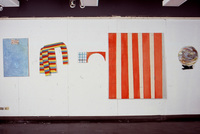 |
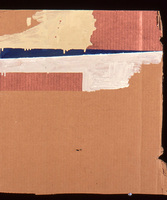 |
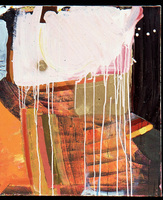 |
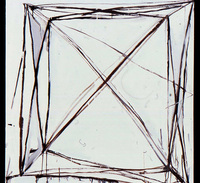 |
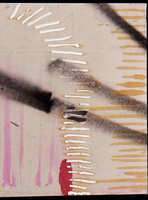 |
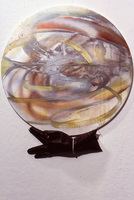 |
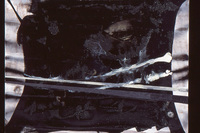 |
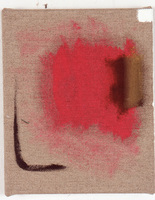 |
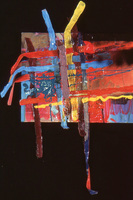 |
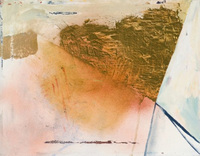 |
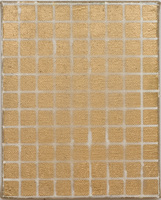 |
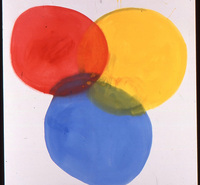 |
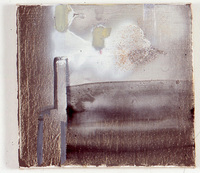 |